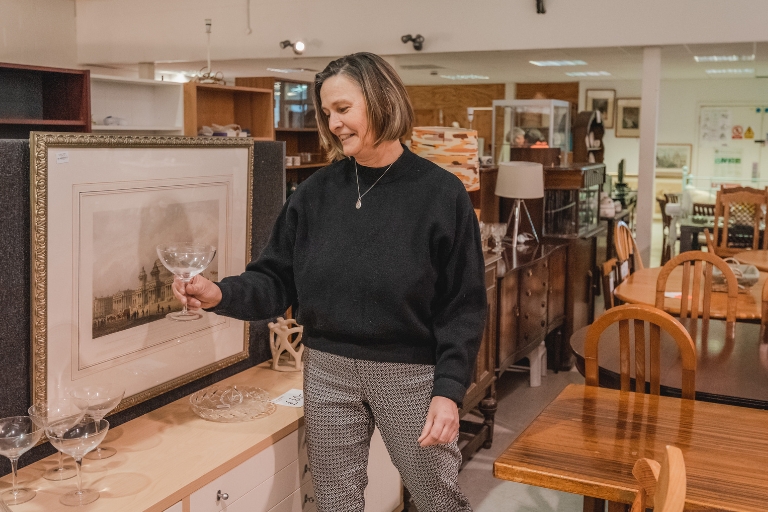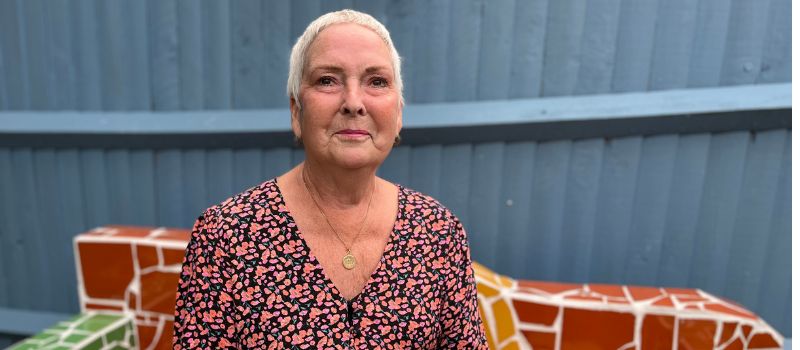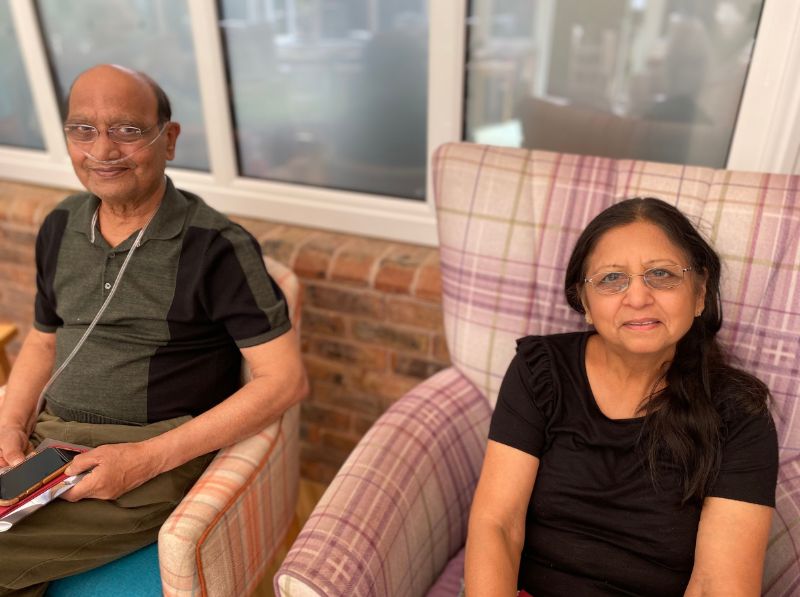“THE HOSPICE IS LIFE CHANGING”
Our doctors and nurses cared for Anthony at the hospice in July 2020 after he was diagnosed with cancer.
“It all started when I woke up feeling quite uncomfortable one day
I told my wife Arlene, that I didn’t feel right. That day we were going to a funeral, but I had to leave early because of my pain. I called an ambulance, but I didn’t fit their criteria, so I had to drive myself to hospital despite the terrible pain I was in.
In hospital I was diagnosed with a tumour. At that point, the idea was to give me chemotherapy to shrink it and cut it out. I was operated on straight away and given a stoma, but when I came round, I was told the doctors couldn’t cut it out like originally planned because the tumour was like jam – sticky.
When Anthony began chemotherapy he became very ill
“I had bad vomiting, about 100 times a day and hiccups,” he explains, “Every time something touched my tongue, I was ill. It was hell on earth. I lost lots and lots of water and my kidneys shut down. Things got so bad I collapsed outside the hospital once.”
Over the next six to seven months Anthony continually struggled with vomiting, hiccups and pain and was in and out of hospital on six separate occasions
“On the wards, I was surrounded by strange faces. It was scary, and I couldn’t even have a visitor because of of COVID.”
It was difficult for Arlene to see her partner so unwell too
“I sometimes thought there’s no end to this when Anthony was so sick,” says Arlene, “And it was so difficult not being able to visit him in hospital. While he was in there my own wellbeing was really going downhill. I wasn’t sleeping or eating and I was crying every day. We’ve always been a couple who have something to talk or laugh about but when I was ringing him in hospital I couldn’t have a conversation with him. I felt like I had nothing to say apart from “Hi, How are you doing?” Anthony didn’t seem to be getting any better either. When your partner is so unwell and you can’t see them, it’s very hard and daunting.
Going home to an empty house would bring to life that things weren’t in my control, and I couldn’t see my family or even have a hug from anyone because of COVID. It was a really tough time.
While Anthony continued to struggle with being so unwell, he didn’t realise that his cancer was terminal
“At no point was I told my cancer was terminal until I went for an MRI and was told out of the blue,” says Anthony.
After one hospital stay doctors recommended that Anthony be put in touch with St Catherine’s Hospice whose nurses could visit him at home
“Hospice nurses started coming to our house and they took control of my illness.”
“When the hospice nurses came to our home they were so respectable and understanding as we were both a bit scared about Anthony being referred to the hospice,” shares Arlene.
“I thought a hospice was for someone who was effectively dying. When you hear the word, you immediately think the worse, that you’re on your way out” explains Anthony but I concentrated on what St Catherine’s could do to help me. Now I know that when a hospice gets involved in your care, it’s not necessarily the case that you’re dying. Palliative care can keep you stable and do other things to help you and your quality of life”
“I thought exactly the same,” adds Arlene, “That hospices were just a place where people died.”
Watch more from Anthony and Arlene in our video call with them below:
Even with St Catherine’s nurses visiting the couple at home, Anthony was still having problems with his sickness and hiccups
“I was trying to care for him” says Arlene, “but hospice nurses reassured us if he went into St Catherine’s the care would feel different to a hospital, and it would be more relaxed. They were so helpful and reassuring. Our mindset was to resolve Anthony’s issues and improve his quality of life for his life expectancy.
But when the hospice was first suggested it was the first time that I thought ‘Oh my god.” When I told my family they questioned me too, asking “Why he’s going into a hospice? Is there something you’re not telling us?”
Anthony didn’t know what to expect about his time in the hospice either, but he says staff were friendlier than other places he’d been
“It wasn’t like I was a patient,” he says, “The care was heart touching and more loving.
Everything was top drawer, from how they spoke and treated me through to the different drugs they tried”
For Arlene being able to visit Anthony at the hospice, during the COVID pandemic, made a huge difference
“Being able to visit Anthony brightened my spirits,” says Arlene. “We could order something to eat or just sit together. After not being able to see him in hospital it made such a difference. I felt I had some control over going to see him and I always felt safe that I was being looked after, so was Anthony and the other patients, with COVID temperature checks and PPE, that was really reassuring.
It uplifted me to see him each day and he started getting better quickly during his time at St Catherine’s. We didn’t really talk about his health there. Sometimes we listened to music on our headphones or watched TV together. Other times I’d go for a walk in the hospice gardens as it was the summer
I’d never really appreciated those type of green spaces before but that space was so good for my mental wellbeing after it had been going downhill when Anthony had been in hospital earlier in the year.”
One of the biggest things for the couple was how was the hospice managed to help Anthony get the symptoms of his illness under control
“In two weeks, St Catherine’s got me into a position that other places weren’t able to over many months. My symptoms are gone and I’ve had no more signs of sickness, hiccups or vomiting. It’s been life changing”
The couple describe the hospice team as “miracle workers”
“A consultant there cared enough to put a proper care plan in place for Anthony. She told us it was in his best interests that she took control of it,” says Arlene, “And I’m so glad she did.
The hospice fully supported Anthony with all of his needs. They’re professional and network with others and have explained things to us so we have more understanding about his medication and their side effects. We felt like we were out of the loop before”
Knowing Anthony was being so well cared for also gave Arlene a vital chance to take care of herself
“I remember one time when I was looking after Anthony, I was invited for a massage to help me relax. I hadn’t had a bath as I’d been looking after him, but Anthony encouraged me to go and take some time, so I threw some clothes on and belted down there. When I arrived, I realised I didn’t even have a bra or knickers on. I’ve always been someone that puts on make up before leaving the house, does my hair, wears heels, but that day I was in trainers. I realised then that I’d really let myself go. I didn’t even recognise myself. It’s so easy for it to happen. I could consume myself thinking about Anthony’s illness. Until it happens, you never think it will affect you, but it’s so important that you use supportive services as otherwise you can get quite isolated.”
The couple say “they don’t know where they’d be today without the hospice.”
“I don’t think Anthony would be so comfortable as he feels now” says Arlene, “He’s had seven months of no illness or vomiting and his health has improved.
We’ve even been on holiday since Anthony was discharged from the hospice. It was a different kind of holiday to our usual as it’s the first one when Anthony’s been unwell, but it gave us hope, and something positive to do together.”
I’m eternally grateful for the hospice’s help” explains Anthony, “I don’t care how my symptoms have gone, I’m just so happy that they have. I’ve taken chocolate and flowers into the hospice a couple of times since I’ve been discharged as a thank you to all the nurses and the teams in the background who looked after me. It’s a thank you for the warmth I felt there”
“The hospice really made us feel unique,” adds Arlene, “People there genuinely had time for us. The receptionists would ask me how I was and they always remembered me. When I arrived, they used to say, oh you’re here to see Anthony. That personalisation makes such a difference.”
“You’re not just a stat at St Catherine’s
The nurse’s banter with you and I even got offered a beer with my dinner,” says Anthony, “The food was homemade, and nurses would always come and say goodbye to me and Arlene before they finished their shift. Everything just made me feel well cared for.”
“The hospice notices you,” says Arlene, “And you never feel like anyone there is too busy to talk to you. Even when Anthony was struggling with things the nurses were so patient. I used to constantly say thank you for looking after him. They’d look at me strangely, but they made it feel like we were at home.
The whole environment was so relaxed, welcoming and comfortable. It didn’t feel clinical, even though there were things like hospital beds, and Anthony didn’t feel just like a cancer patient. To us, the hospice did feel like home”
That feeling of home was important because before spending time in the hospice the couple were faced with Anthony’s illness in hospital
“In the waiting areas you could tell the different stages of cancer by looking at someone,” explains Arlene, “I was distraught. When you or someone you love has been diagnosed, you might know what’s coming, but you don’t want to be faced with that deterioration.”
Even though Anthony is back home now the couple feel reassured that if they’re ever worried they can call the hospice
“The team have guided me through Anthony’s medication,” says Arlene, “I know I can ask questions like what can I or should I do if this happens? And can ring anytime 24/7. It’s guaranteed the nurses will call us back. If they say they will, they do at the exact time they’ve told us. They try all our numbers, Anthony’s, mine, our house phone, and I feel like I’m in the loop now. That really helps.”
“The nurses still call regularly and check in on me which is good” adds Anthony, “I don’t think I ever go two weeks without someone from St Catherine’s ringing.”
Anthony understands why other people who are told they might need to stay in the hospice may fear the worse, but he says, “Take time out to educate yourself. Read up about the hospice and ask any questions you have. It’s not all doom and gloom there. Hands down, St Catherine’s is light years ahead in how they treat you as an individual”
Arlene agrees, “I’d move the world for St Catherine’s now, and I’d jump at the idea of going to a hospice if I ever needed it knowing what I know now.
I can’t thank St Catherine’s enough for what they’ve done for Anthony and I.”
Our Stories
Hear from our patients, their relatives, our staff and volunteers about the care of St Catherine’s Hospice.
Or for even more stories, updates and news from St Catherine’s Hospice, why not have a read of our biannual Matters magazine?
To read the latest edition of Matters, click here.
Don’t forget to follow us on social media for our latest stories
You can find us here:
Facebook: St Catherine’s Hospice, Crawley and St Catherine’s Hospice Fundraisers
Twitter: @StCHospice
Instagram: @stcatherinescrawley
LinkedIn: St Catherine’s Hospice, Crawley











